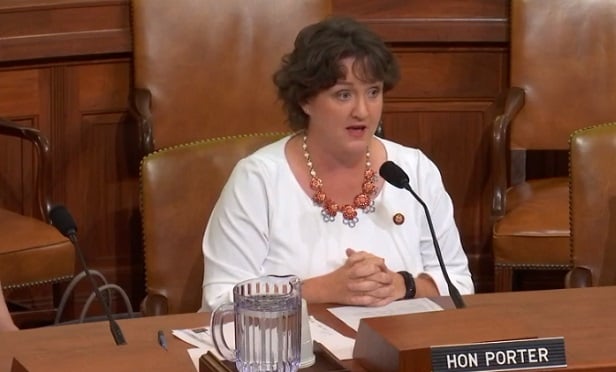 Rep. Katie Porter, D-Calif.stole the show with a personal account of the emergencyappendectomy she had while she was campaigning. (Photo: House Waysand Means)
Rep. Katie Porter, D-Calif.stole the show with a personal account of the emergencyappendectomy she had while she was campaigning. (Photo: House Waysand Means)
A House Ways and Means health subcommittee hearing held Tuesdayhighlighted a problem that could challenge any life, health orannuity groups trying to get legislation through Congress: ManyHouse Democrats are hazy on how insurers see things.
|The subcommittee organized the hearing to address the “balance billing,” or “surprise medical bill”issue: Cases of patients who end up with big medical bills becausethey used emergency care out of network, or who received ordinarycare at in-patient hospitals and discovered later, to their horror,that some of the providers involved were out of network.
|Related: Surprise billing: the U.S. needs betterdefinitions
|The House Ways and Means subcommittee chair, Rep. Lloyd Doggett,D-Texas, is trying to round up support for H.R. 861, a bill thatwould require any hospital seeking to participate in Medicare toprovide any out-of-network insured patients, whether the patientswere covered by Medicare or by other health insuranceprograms, with detailed out-of-network cost notices.
|The notices would have to warn the patients about the likelihoodthat they would be getting care out of network, and explaining whatkinds of bills they might end up having to pay.
|A hospital that wanted to be part of Medicare and failed toprovide a balance billing warning notice could bill an insuredpatient only for the cost-sharing amount the patient would haveowed if the care had been provided by an in-network provider.
|If a hospital in the Medicare program provided emergency care toan insured patient outside of the patient's health plan network,the hospital could bill the patient only for the patient's usualin-network cost-sharing amounts.
|“The sole focus of the bill is to protect insured patients frombeing trapped between an insurer and an out-of-network provider,”Doggett said at the hearing, which was streamed live on theweb.
|States are taking action, but federal action is also necessary,because about 40 percent of patients in Texas, forexample, are in group health plans that fall under theEmployee Retirement Security Act of 1974 (ERISA) state healthbenefits preemption rules, and state laws and regulations have noeffect on ERISA plans' out-of-network coverage, Doggettsaid.
|Here are three takeaways for agents and brokers fromthe hearing.
|1. Lawmakers see control over health care providers' ability toparticipate Medicare as a great motivator.
Doggett is not trying to have the federal government imposebalance billing restrictions or notice requirements directly, andit's possible that the federal government may have no authorityunder the U.S. Constitution to do so. But Congress does appear tohave the ability to decide which organizations can participate inMedicare.
|Providers' eagerness to participate in Medicare could have abearing on how Medicare for All or other health finance systemchange proposals fare.
|2. Many health care providers strongly object to specificproposals for setting standards for reasonable out-of-networkreimbursement rates.
Dr. Bobby Mukkamala, a member of the American MedicalAssociation, talked about ideas, which have been proposed byAmerica's Health Insurance Plans (AHIP) and by other insurer,benefits and patient advocacy groups, of creating standardout-of-network care payment levels based on Medicare reimbursementrates, or on health insurers' views on what reasonable rates oughtto be.
|“Medicare physician payment has declined 19% over the past 17years,” Mukkamala said.
|Basing out-of-network care payment rates on Medicare rates“would eliminate any incentive for insurers to build adequatenetworks or offer physicians fair contracts,” Mukkamala said.
|Any payment benchmark must “come from sources independent ofinterested party manipulation,” Mukkamala said.
|3. Many lawmakers are a lot more familiar with doctorsthan they are with health insurers.
Jeanette Thornton, a senior vice president atAHIP, made that case that lawmakers and othersshould consider what reimbursement policy changes will due tohealth plan finances and health coverage costs, not justout-of-pocket costs for one particular visit, or what providerswill earn for one particular patient.
|For a hypothetical woman who needs hospital care, “it's reallyimportant that, when we're thinking about how to solve this issue,we're not doing it in a way that's going to raise her premiumsgoing forward,” Thornton said.
|James Patrick Gelfand, a senior vice president at the ERISAIndustry Committee — a group dominated by large employersand the administrators and consultants that serve them —testified that many hospitals are owned by big, investor-ownedcorporations, and that even nonprofit hospitals may have outsourcedemergency rooms to investor-owned companies that are intentionallycreating situations that lead to big, surprise bills.
|But Rep. Katie Porter, D-Calif. — a new member of Congress and amember of the faculty of the University of California Irvine lawschool — stole the show with a personal account of theemergency appendectomy she had while she was campaigning. She wentto an in-network hospital, but the surgeon turned out to be out ofnetwork. He billed her for $3,000.
|Porter gave no indication at the hearing that she thought herhealth plan, Anthem Inc., might have had reasonable concerns aboutthe surgeon's bill.
|For Anthem's Anthem Blue Cross of California unit, “$3,000 wastoo high a price for saving my life,” Porter said at the hearing.“The tens of thousands in premiums I had paid to that company overthe years were not enough to have them cover the cost oflife-saving care.”
|Resources
Links to balance billing resources, including a video recordingof the hearing, are available here.
||
Read more:
Complete your profile to continue reading and get FREE access to BenefitsPRO, part of your ALM digital membership.
Your access to unlimited BenefitsPRO content isn’t changing.
Once you are an ALM digital member, you’ll receive:
- Critical BenefitsPRO information including cutting edge post-reform success strategies, access to educational webcasts and videos, resources from industry leaders, and informative Newsletters.
- Exclusive discounts on ALM, BenefitsPRO magazine and BenefitsPRO.com events
- Access to other award-winning ALM websites including ThinkAdvisor.com and Law.com
Already have an account? Sign In







